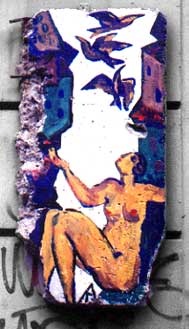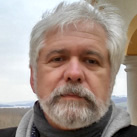| |
Sound Art |
In My Language I am Smart
- The Immigrant Song -
|
 Digital illustration © 2005 Dragan Todorovic
Digital illustration © 2005 Dragan Todorovic |
“In My Language I am Smart”, my piece for Deep Wireless festival of sound art, was broadcast in May 2005 on CBC Radio One.
There was some nice feedback from the listeners. Here are some parts:
“I LOVED today’s show! PLEASE make every effort to provide audio for this one on your website. Kudos to the author and to you people at CBC for helping him to bring it to your listeners.
I'd like all native-born Canadians, as well as new immigrants, to have many more opportunities to hear, read and study this fine work by Dragan Todorovic.”
- Susan Morton, Waterloo, ON
“[Dragan Todorovic’s] rendering of the separation anxiety that accompanies loss of the mother tongue and immersion in the bewildering and innumerably unpredictable patterns of English was so vivid and inspired that his personal journey became truly universal.” |
“Magical and powerful audio experience!” - Michele Foley
“This morning’s ‘OutFront’ was brilliant! How do I get a copy of this?” - David Tickner
Thanks to all of you who made an effort to send your thoughts! Those of you who would like to hear the radio mix can find it in RealAudio™ here (streaming from this site) or as an MP3 here.
With help from Darren Copeland, the artistic director of Deep Wireless, the piece was mixed in its final, 8-channel version. The experience of listening to this spatialized version was truly great, almost physical, as all those present on the evening of May 28 at the Drake Hotel in Toronto can witness. I hope you will be able to catch this version at a venue near you :-)
Read more about Deep Wireless here (feel free to explore the links - you might find something of interest). |
Notes:
Although I have learned English relatively early, and studied it through the better part of my school years, when I came to Canada to live here in 1995 I realized quickly that I had a problem. It was not so much with my vocabulary, or my spelling—on the contrary, that part of my education was very good—but with the precise meaning and finesse of expression. The sentences I learned to use, the constructions, the tone – all came from the Hollywood movies and rock and roll, and these areas mostly use brutal, short-cut constructions. Of course, I was thinking in my mother’s tongue – Serbian – and translated my thoughts, but that didn’t help for two reasons: either I was slow with this process, and by the time I had my precise meaning translated in English the conversation had shifted in some other direction, or I would come up with a quick construction that only the most benevolent person would care to decipher.
But my biggest problem was the sound of my English. Language is acquired with its sound, and the sounds I had picked from records and movies were harsh, aggressive, and presented me in a very different light from who I was and am. Suddenly I realized that somewhere in the process of acquiring the tone of modern English I had lost my identity. It was painful to realize that in my language I was smart, but I sounded stupid in English. Example: while walking with my Canadian friend one day by a church, he started talking about the architecture of that particular building, and while I wanted to say a few things about how I liked the Gothic details on the arch at the entrance, and how I admired the intelligent choice of stones, all I could squeeze out was, “Yeah, it’s cool”.
Acquired meaning is superficial. Sound puts word into context, but the deeper shades of expression are not learned. I responded the way that Clint Eastwood, or some other action hero, would in one of their roles. Back in Serbian language I was connoisseur of arts; in my newly acquired language I was a cop.
Where do I belong after going through this experience?
The process of learning a new language is not rounded and simple: at first, it is not the language as a whole that is acquired, but a series of foreign words is superimposed onto mother's tongue. Unavoidably, one has to go through a mutation that is both painful and funny. This piece is an exploration of the immigrant's experience.
top |
|
Checkpoint Berlin
radio
documentary
In September 2003 , CBC
Radio One presented my documentary “Checkpoint Berlin”.
This project, somewhere between a “true” documentary
and audio art, is a story about Berlin , the city that was the
metaphor of the Cold War. The Wall that served to prevent leaving
and not entering divided Berlin for almost three decades, leaving
ineffaceable marks on the tissue of Europe and the rest of the
world. The demolition of the Wall started the slow process of
healing, but that doesn’t mean we should ever forget
Berlin.

|
Piece of the original
Berlin Wall, on display at Checkpoint Charlie. © 2003
D. Todorovic
|
Many authors in the past, and even today, take Berlin
as a symbol of the concentrated power it had in times of the
Third Reich. Others were, and still are, simply fascinated with
its history, both before and after Hitler's time. For me, Berlin holds another kind of power, something the city
acquired only after the Wall was removed. This project is a story
about discovering that other power.
“Checkpoint Berlin” was recorded in summer
of 2003 in Berlin and Toronto , and it was aired as part of CBC's
prestigious series Outfront, which has won practically
every major radio award in the world (Premias Ondas, Prix Italia, New York Festivals.).
I signed this project as its complete
author (script, recording, editing, post production and pieces
of original music). The producer for CBC was Laurence Stevenson.
Length: 14 minutes.
Monday, September 22, 2003 .
CBC Radio One.
11:45 AM
Now you can hear Checkpoint Berlin in RealAudio™:
|
|
|
|

